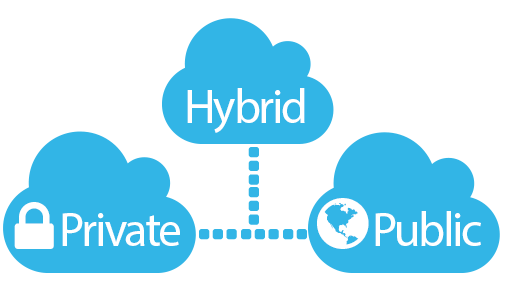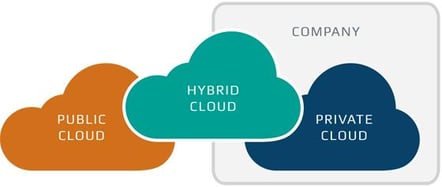Hybrid vs Public vs Private Cloud?
November 1, 2017 •Network Solutions


Public Cloud
Public Cloud has its advantages and disadvantages just like any other solutions. It's all about understanding the difference and being able to determine what works for you. The public cloud is known as IaaS which stands for infrastructure as a service. So here is the big difference - the public cloud isn't owned or operated by you. It is owned and operated by a third party. They handle the infrastructure, data storage, and even security.
What benefit does this have? First, it converts the cost of network infrastructure from a capital expense to an operating expense. This gives CFOs the ability to have a more predictable cost of ownership. When deploying on-premise solutions things go wrong and when they do, it's on the company to fix it. If a core switch decides to die or you need an entire refresh then things are going to get expensive. A public cloud solution is handled by a third party so that cost is put on the provider of the cloud instead of the company using it. An example of a public cloud is Amazon Web Services or US Signal.

Private Cloud
A private cloud is not open for anyone to use and is typically hosted on a company's intranet or private data center servers using a program like VMWare. The private cloud gives you the ability to host applications in a cloud environment without giving up control. With a private cloud, you are able to have more ownership and control of the cloud environment because it lives inside your company's infrastructure and is managed by internal resources. This gives you the ability to completely determine how, when, where, and who has access to sensitive company data.
We are seeing the private cloud being deployed mainly in medium to enterprise sized businesses because they already have the massive infrastrucutre and data centers that are able to host a private cloud. It's more advantageous for them because they are not taking on the capital expense that a small business would and have more of a need for personalized management.
Hybrid Cloud
Enterprise networking is often so complex that neither one of these solutions alone will help solve business challenges. This is where hybrid cloud comes in. The hybrid cloud is a mixture of on-premise, private cloud, and public cloud. This gives, typically larger companies, the flexibility and scalability of the cloud while still maintaining necessary processes for meeting compliance rules.
Hybrid cloud gives companies the freedom to do what is best for their applications. There is no gaurantee that all applications will operate efficiently in the cloud so they explore both options and more often than not, they choose a hybrid solution. Companies aren't using the term "moving to the cloud" but instead are saying they will "utilize the cloud." This distinction shows that there are needs that the cloud can't offer larger organizations because of the complexities that surround it. Right now, this hybrid solution is the best way to maximize your asset utilization while still being able to provide flexibility and scalability.
Get Updates
Featured Articles
Categories
- AI (19)
- Automated Technology (10)
- backup (1)
- Cisco (33)
- Cisco Live Update (1)
- Cisco News (2)
- Cisco UCS (1)
- Cloud Networking (5)
- Collaboration (26)
- compute (1)
- CyberSecurity (36)
- Data Center (33)
- Defense (1)
- DevOps (3)
- DisasterRecovery (1)
- DNA (2)
- Education (3)
- Encryption (1)
- Enterprise Networking (34)
- Full-Stack (1)
- Future (1)
- healthcare (2)
- hybrid cloud (1)
- Hybrid Cloud Strategy (1)
- Hyperconverged Infrastructure (1)
- Infrastructure Cost Optimization (1)
- Innovation (1)
- Innovative Technology (12)
- Internet of Things (2)
- IoT (2)
- Managed Services (11)
- Manufacturing (1)
- Modern Data Center (2)
- Monitoring (2)
- Network Management (4)
- Networking (3)
- NSI (1)
- nutanix (1)
- Observability (1)
- OT (1)
- Ransomware (2)
- SchoolTechnology (6)
- SD-WAN (1)
- SDN (1)
- securit (1)
- Security (77)
- security management (6)
- security strategy (9)
- SSE (2)
- sustainability (1)
- Telehealth (4)
- Telemedicine (1)
- veeam (1)
- Video (1)
- videoconferencing (1)
- Virtualization (2)
- VMware to Nutanix (2)
- webex (3)
- wifi (1)
- XDR (1)
- Zero Trust (8)


